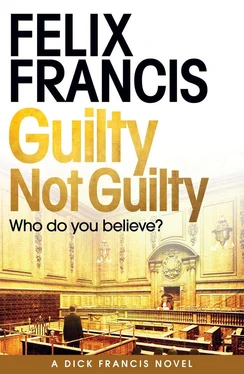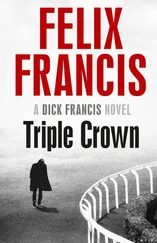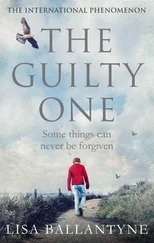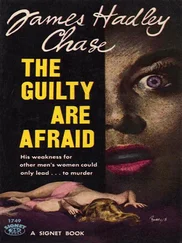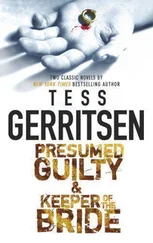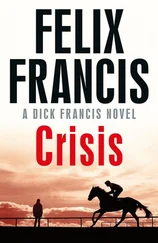‘Shame on you,’ one man shouted at me, echoing the email from Joe Bradbury.
‘Murderer,’ yelled a young woman wearing a full-length black coat, who then encouraged those around her to join in the abuse.
I realised that it had been a huge mistake to come and I sought refuge from the mob in the Stewards’ Room, using my authorised pass to gain entrance to the weighing room complex beneath the grandstand concourse.
Even though I wasn’t down to act in an official capacity at the meeting, it was quite common for qualified stewards to report early to the day’s chairman just in case there was an emergency and more stewards were needed than had been booked.
However, on this day, even the Stewards’ Room was not a safe harbour in my storm.
‘What the hell do you think you’re doing here?’ George Longcross demanded.
Oh, shit ! I hadn’t appreciated that he was acting as chairman.
‘You are not welcome,’ George said. ‘You’ve brought the sport into disrepute.’
‘How exactly?’ I asked.
‘Stands to reason,’ he replied arrogantly. ‘By being accused of murder.’
‘I haven’t been accused of murder,’ I pointed out. ‘And I have not been arrested. I have simply been questioned by the police about the murder of my wife, but not as a suspect.’
‘Humph!’ he uttered in disbelief. ‘That’s not what the papers are saying.’
And it was also not how I felt.
‘Then the papers are wrong. Otherwise, how would I be able to be here?’
For a moment he seemed confused but he was not going to back down. George Longcross had probably never once backed down in his whole life. I had always considered him to be an overbearing pompous snob and nothing about this exchange had encouraged me to change my opinion.
‘I order you to leave,’ he said angrily. ‘Right now.’
I wondered if he had the authority to make such an order but decided that putting it to the test was unlikely to make me any friends in the racing establishment.
So I left, and not only the Stewards’ Room but also the whole racecourse — but not before half a dozen or so more members of the public had vented their rage at my presence. One of them was even acquainted with me slightly through our time riding together as amateur jockeys, and he was particularly vitriolic, accusing me of bringing disgrace on a noble family.
‘Your father must be horrified,’ he shouted at my face from about six inches away.
‘I haven’t done anything wrong,’ I protested, but it fell on deaf ears. He’d read the newspapers — he knew.
But I was, indeed, very apprehensive of what my father might be thinking. And my mother too. For the most part, my parents lived in their own ivory tower in the Welsh Marches, where they were more concerned with how they could afford to keep the castle roof watertight than they were with the major news stories of the day.
I knew that they were aware of Amelia’s death — Douglas had phoned them on the first evening I’d been in his house — but I had yet to be in contact with them myself.
I’d never been that close to my parents; indeed, as a young child I had been cherished far more by my grandparents. I believed that my mother had been more ‘hands on’ when my two elder brothers were born but, by the time I arrived eight years later, she was far too busy running the local church and history groups to worry about her new baby. In those days, before my grandfather’s death duties had laid waste to the family fortune, there had been an army of domestic staff to cook my meals and wash my clothes, and, later, even a chauffeur to drive me to and from my boarding schools. Not that I’d felt particularly deprived of maternal affection at the time. It was just the way things were, and I knew nothing different. Only much later, as a teenager and after my grandmother’s death, did I start wondering if my arrival into this world had been a huge blunder on my parents’ part.
So I hadn’t called them yet, not least because my father, in particular, would have been hugely embarrassed if I’d been in an emotional state with him on the telephone. But perhaps now was the time to remind them not to believe everything they read in the newspapers.
I caught the train back to London from Ascot station while many were still arriving for one of the great days of British racing — Champions Day, the last great hurrah before flat racing on turf went into hibernation for the four and a half long months of winter.
Why had I come in the first place?
I had been humiliated, especially by George Longcross.
He and I had never really seen eye to eye. He was a harsh judge and was always quick to blame the jockeys for the slightest interference, even when it had been completely accidental or due to one of the horses reacting without warning. I, on the other hand, tended to try and give the benefit of the doubt to the riders.
Professional jockeys are self-employed and hence don’t get paid unless they are racing, so any decision to suspend them from riding affects their ability to earn a living. Nevertheless, and irrespective of their fame and fortune, George Longcross treated them like servants, referring to them always by their surnames alone. I had a more sanguine approach, while at all times upholding the strict Rules of Racing.
I felt there had to be a delicate balance between carrot and stick, considering most of the people the stewards deal with have hugely more experience of racing than we do, and far greater earnings. It’s similar to football, where a Premier League star earning hundreds of thousands of pounds a week is under the control of a referee who is paid only a small fraction of that in a full year, and is most unlikely to have ever played the game professionally.
I believed that respect should be a two-way process but George Longcross demanded absolute subservience both from the sport’s participants and from his fellow stewards, with no place for empathy, compromise or compassion. It didn’t do much for his popularity rating at any time, and especially not with me at the moment.
I kept my eyes down on the train to Waterloo, thankfully arriving without any unpleasant confrontations with my fellow passengers.
‘Chester Square, please,’ I said to the driver of a black cab at the station taxi rank.
We set off and I wondered if it was my paranoia or was he really looking at me via his rear-view mirror more than at the road ahead?
But he must have been paying more attention to the traffic than I’d realised, as we made it safely to Chester Square without so much as the slightest bump or scrape.
I stood on the pavement and paid him through the open window, including a tip.
‘Good luck, mate,’ he said.
I looked at him enquiringly, but he wasn’t finished, not by a long way.
‘But you’re going to need more than luck where you’re going.’
‘I didn’t do it,’ I said, but I could see from his expression that he didn’t believe me.
I nearly asked him for my tip back.
Douglas wasn’t at home. I knew he wouldn’t be. He’d left on Friday afternoon for a rare day’s partridge shooting in Somerset. He was staying down there with friends and not leaving until after lunch on Sunday.
He had offered not to go. He said he would remain in London and look after me, but I had insisted he went. I told him I’d be fine if I could stay in the house — ‘As long as you like, dear boy’ — and I knew how much he enjoyed his shooting.
It was partly why I’d gone to the races, as the hours until Douglas’s return seemed to stretch interminably ahead with nothing for me to do. The choice was either to sit in front of the television all day and get drunk, or go to the races and stay sober.
Читать дальше
